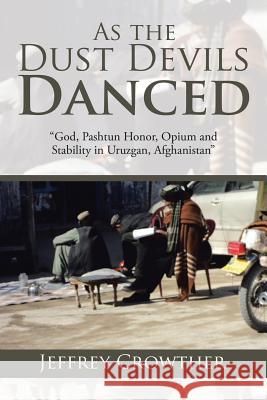As the Dust Devils Danced: God, Pashtun Honor, Opium and Stability in Uruzgan, Afghanistan » książka
As the Dust Devils Danced: God, Pashtun Honor, Opium and Stability in Uruzgan, Afghanistan
ISBN-13: 9781504963527 / Angielski / Miękka / 2015 / 228 str.
As the Dust Devils Danced: God, Pashtun Honor, Opium and Stability in Uruzgan, Afghanistan
ISBN-13: 9781504963527 / Angielski / Miękka / 2015 / 228 str.
(netto: 73,82 VAT: 5%)
Najniższa cena z 30 dni: 77,09 zł
ok. 16-18 dni roboczych
Bez gwarancji dostawy przed świętami
Darmowa dostawa!
I held the pod that had oozed the dark opium paste, which had since been scraped and packed away. The special tool with the multiple razor-sharp blades had left the unique diagonal parallel line cut marks. As I turned the pod, I saw four more areas where the same diagonal cut had been made. Stewart, our PRT agricultural advisor, took the pod from me and told me it had been a good harvest of opium this year. While we poured millions of dollars into the region, Uruzgan had become a center of the worldwide illicit opium trade. It is the foundation of their economy. Everything and everyone is tied to it. I looked west over the mountain toward the town of Deh Rawud, where Mullah Omar, the spiritual leader of the Taliban, grew up under the harsh hand of his uncle, who was also his stepfather. He would leave there for Kandahar and later bring the Taliban movement back to Uruzgan and all of Afghanistan. Though the Taliban would at first outlaw the opium trade, they would later embrace it as no other export of Afghanistan brings in so much money to this extremely underdeveloped country. Whoever is in power, locally and nationally, must control it or others will exploit the wealth it brings and take their place. In the heat of the day, several dust devils spiraling hundreds of feet into the air were dancing across the sprawling dusty landscape between my perch on Camp Ripley and the green irrigated farmlands just outside the Uruzgan provincial capital of Tarin Kowt. The nesh, the poppy harvest, was over and the fighting season in Afghanistan had begun its deadly yearly cycle. The opium these poppy plants produced was opposed by the international forces because it was a money source for the now insurgent Taliban forces. However, with over ten thousand hectares under cultivation in Uruzgan, I knew everyone of consequence in the region had a hand in the trade.
I held the pod that had oozed the dark opium paste, which had since been scraped and packed away. The special tool with the multiple razor-sharp blades had left the unique diagonal parallel line cut marks. As I turned the pod, I saw four more areas where the same diagonal cut had been made. Stewart, our PRT agricultural advisor, took the pod from me and told me it had been a good harvest of opium this year. While we poured millions of dollars into the region, Uruzgan had become a center of the worldwide illicit opium trade. It is the foundation of their economy. Everything and everyone is tied to it. I looked west over the mountain toward the town of Deh Rawud, where Mullah Omar, the spiritual leader of the Taliban, grew up under the harsh hand of his uncle, who was also his stepfather. He would leave there for Kandahar and later bring the Taliban movement back to Uruzgan and all of Afghanistan. Though the Taliban would at first outlaw the opium trade, they would later embrace it as no other export of Afghanistan brings in so much money to this extremely underdeveloped country. Whoever is in power, locally and nationally, must control it or others will exploit the wealth it brings and take their place. In the heat of the day, several dust devils spiraling hundreds of feet into the air were dancing across the sprawling dusty landscape between my perch on Camp Ripley and the green irrigated farmlands just outside the Uruzgan provincial capital of Tarin Kowt. The nesh, the poppy harvest, was over and the fighting season in Afghanistan had begun its deadly yearly cycle. The opium these poppy plants produced was opposed by the international forces because it was a money source for the now insurgent Taliban forces. However, with over ten thousand hectares under cultivation in Uruzgan, I knew everyone of consequence in the region had a hand in the trade.











